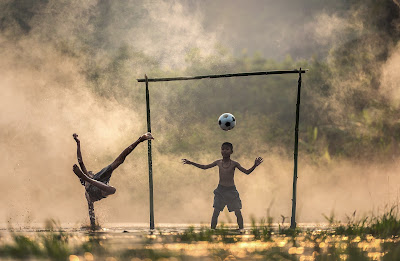Fostering personal courage in children
- Get link
- X
- Other Apps
Fostering personal courage in children is an important aspect of their growth and development. Personal courage refers to the ability to face challenges, take risks, and persevere in the face of adversity. Children who possess personal courage are more likely to succeed in life and face their challenges with confidence and resilience.
Understanding personal courage in children is the first step in fostering this important trait. Personal courage is characterized by a sense of bravery and determination, a willingness to take risks, and the ability to face challenges with confidence. Children who display personal courage are not afraid to speak up for what they believe in, stand up for themselves, and face their fears.
Examples of personal courage in children can range from small acts of bravery, such as standing up to a bully, to more significant acts such as advocating for a cause they believe in. Children who display personal courage are able to overcome their fears and take action even when the outcome is uncertain. This type of courage is important for children's growth and development because it helps them build self-esteem, develop problem-solving skills, and become more confident in their abilities.
Creating a supportive environment for personal courage is essential for fostering this important trait in children. Parents and caregivers can encourage independence and decision-making by giving children choices and allowing them to make mistakes. Encouraging a growth mindset, where children view challenges as opportunities for growth and learning, can also help build personal courage. Providing children with opportunities to take risks, such as trying new activities or taking on new responsibilities, can help build their confidence and foster personal courage.
Teaching personal courage through practical experience is another effective way to foster this trait in children. Role-playing and simulations can help children practice facing challenges and dealing with difficult situations.
Understanding personal courage in children
Personal courage is a vital aspect of children's growth and development. It refers to the ability to face challenges, take risks, and persevere in the face of adversity. Children who possess personal courage are more likely to succeed in life and face their challenges with confidence and resilience. In this article, we will explore the characteristics of personal courage, examples of personal courage in children, and why it is important for their growth and development.
A. Characteristics of personal courage: Personal courage is characterized by a sense of bravery and determination, a willingness to take risks, and the ability to face challenges with confidence. Children who display personal courage are not afraid to speak up for what they believe in, stand up for themselves, and face their fears. They also have a positive outlook and believe in their abilities to overcome obstacles. Personal courage also involves having empathy for others and standing up for those who are vulnerable.
B. Examples of personal courage in children: Personal courage can be demonstrated in many different ways. Children can show personal courage by standing up to a bully, advocating for a cause they believe in, trying new activities, or facing their fears. For example, a child who has a fear of public speaking may choose to give a speech in front of their classmates, demonstrating their bravery and determination. Another child may choose to stand up for a classmate who is being bullied, displaying their empathy and courage.
C. Why personal courage is important for children's growth and development: Personal courage is important for children's growth and development because it helps them build self-esteem, develop problem-solving skills, and become more confident in their abilities. Children who possess personal courage are more likely to take on new challenges and are less likely to be discouraged by setbacks. Personal courage also helps children develop a positive self-image, which is essential for their overall well-being. Children who display personal courage are also more likely to be respected by their peers and are better equipped to handle difficult situations in the future.
Fostering personal courage in children is an essential aspect of their growth and development. Children who possess personal courage are more likely to succeed in life and face their challenges with confidence and resilience. By understanding the characteristics of personal courage, providing opportunities for children to take risks, and encouraging positive reinforcement, parents and caregivers can help children develop this important trait. By doing so, children will be better equipped to face their challenges with courage and determination, which will help them lead a more fulfilling life.
Building a supportive environment for personal courage
Building a supportive environment for personal courage in children is an essential aspect of their growth and development. Personal courage refers to the ability to face challenges, take risks, and persevere in the face of adversity. Children who possess personal courage are more likely to succeed in life and face their challenges with confidence and resilience. In this article, we will explore how to create a supportive environment for fostering personal courage in children.
A. Encouraging independence and decision-making: One of the most effective ways to build a supportive environment for personal courage is to encourage independence and decision-making. This means giving children choices and allowing them to make mistakes. For example, parents and caregivers can give children the opportunity to choose what they want to eat for dinner or what they want to wear. By giving children choices, they learn to make decisions and take responsibility for their actions, which is an essential aspect of personal courage.
B. Promoting a growth mindset: Another way to build a supportive environment for personal courage is to promote a growth mindset. A growth mindset is the belief that challenges are opportunities for growth and learning.
Teaching personal courage through practical experience
Teaching personal courage to children through practical experience is an effective way to help them develop this important trait. Personal courage refers to the ability to face challenges, take risks, and persevere in the face of adversity. Children who possess personal courage are more likely to succeed in life and face their challenges with confidence and resilience. In this article, we will explore how to teach personal courage to children through practical experience, with a focus on role-playing and simulations, encouraging children to face challenges, and celebrating bravery and perseverance.
A. Role-playing and simulations: Role-playing and simulations are effective methods for teaching personal courage to children. By engaging in role-playing, children can learn how to handle different situations and develop problem-solving skills. For example, parents and caregivers can engage in role-playing scenarios such as handling a difficult conversation with
a peer or standing up for oneself in a challenging situation. These scenarios provide a safe and controlled environment for children to practice and build their courage. Simulations, such as outdoor adventures or obstacle courses, also provide children with the opportunity to face physical challenges and build their courage.
B. Encouraging children to face challenges: Encouraging children to face challenges is another important aspect of teaching personal courage. By encouraging children to take risks and try new things, they learn to overcome their fears and develop resilience. For example, parents and caregivers can encourage children to participate in activities that challenge them, such as sports, public speaking, or community service projects. By facing challenges, children develop a sense of bravery and determination, which is an essential aspect of personal courage.
C. Celebrating bravery and perseverance: Celebrating bravery and perseverance is a critical component of teaching personal courage. By recognizing and rewarding children for their courage, parents and caregivers can help them build self-esteem and confidence. For example, parents and caregivers can acknowledge when children have faced a challenge and praise them for their bravery. They can also provide opportunities for children to share their experiences and accomplishments, which can help them feel proud and recognized.
With personal courage, children will be better equipped to face their challenges with determination and overcome obstacles, which will help them lead a more fulfilling life.
Encouraging personal courage through positive reinforcement
Encouraging personal courage in children through positive reinforcement is a powerful way to help them develop this essential trait. Personal courage refers to the ability to face challenges, take risks, and persevere in the face of adversity. Children who possess personal courage are more likely to succeed in life and face their challenges with confidence and resilience. In this article, we will explore how to encourage personal courage in children through positive reinforcement, with a focus on praising children for their bravery, teaching children to recognize and appreciate their own courage, and creating a supportive community that values personal courage.
A. Praising children for their bravery: Praising children for their bravery is an effective way to encourage personal courage. By acknowledging and rewarding children for their courage, parents and caregivers can help them build self-esteem and confidence. For example, parents and caregivers can praise children for facing their fears, trying new things, and standing up for what they believe in. This recognition can provide children with a sense of pride and help them feel more confident and resilient.
B. Teaching children to recognize and appreciate their own courage: Teaching children to recognize and appreciate their own courage is another important aspect of encouraging personal courage. By helping children understand their own courage and the positive impact it has on their lives, they can develop a stronger sense of self-esteem and confidence. Parents and caregivers can encourage children to reflect on their experiences and appreciate their own bravery. They can also help children understand the importance of personal courage and how it can lead to a more fulfilling life.
C. Creating a supportive community that values personal courage: Creating a supportive community that values personal courage is critical to encouraging children to develop this trait. A supportive community can provide children with a sense of belonging and help them feel confident and secure. For example, parents and caregivers can provide opportunities for children to connect with peers who share similar values and encourage them to participate in activities that challenge them. They can also encourage children to join clubs, sports teams, or community organizations that promote courage and perseverance.
Encouraging personal courage in children through positive reinforcement is an effective way to help them develop this essential trait.
- Get link
- X
- Other Apps


